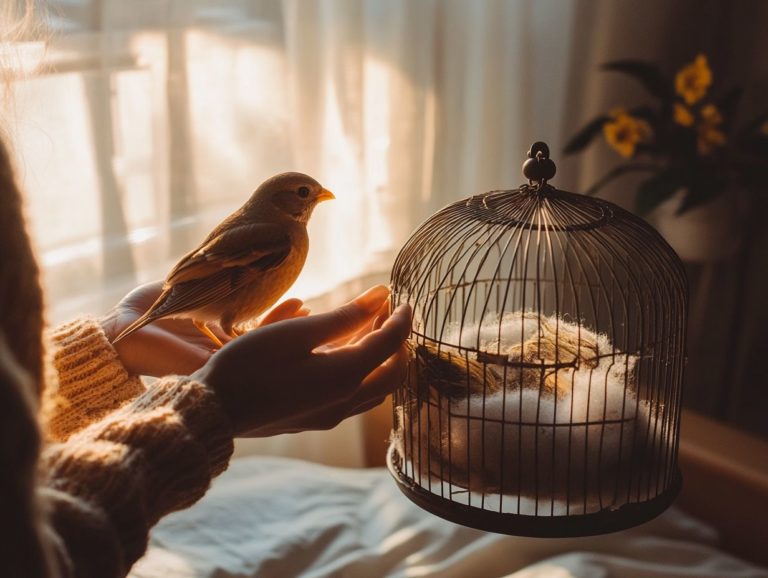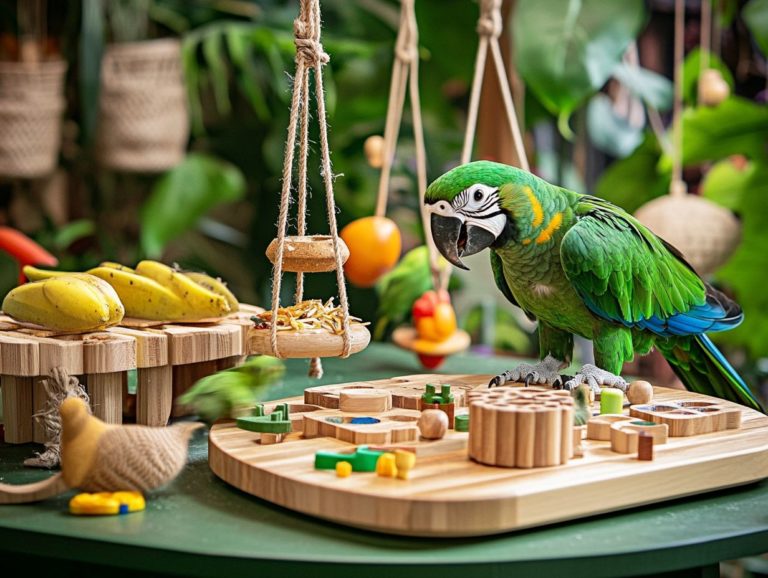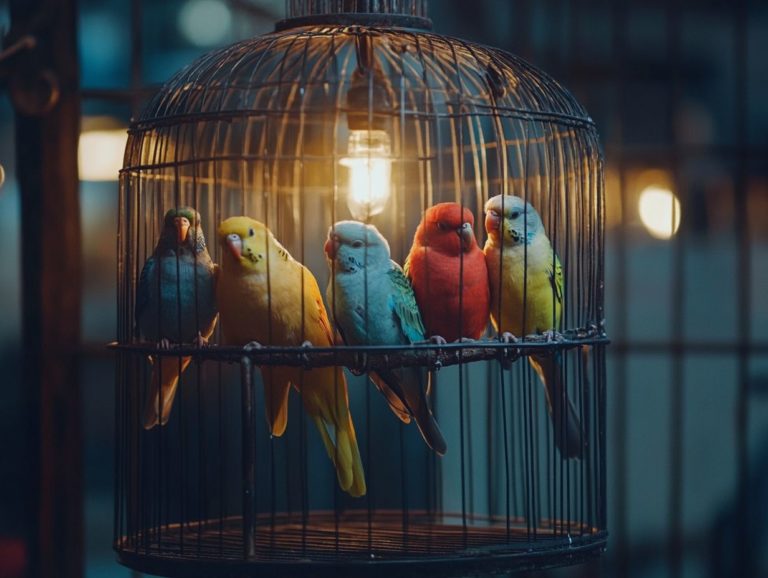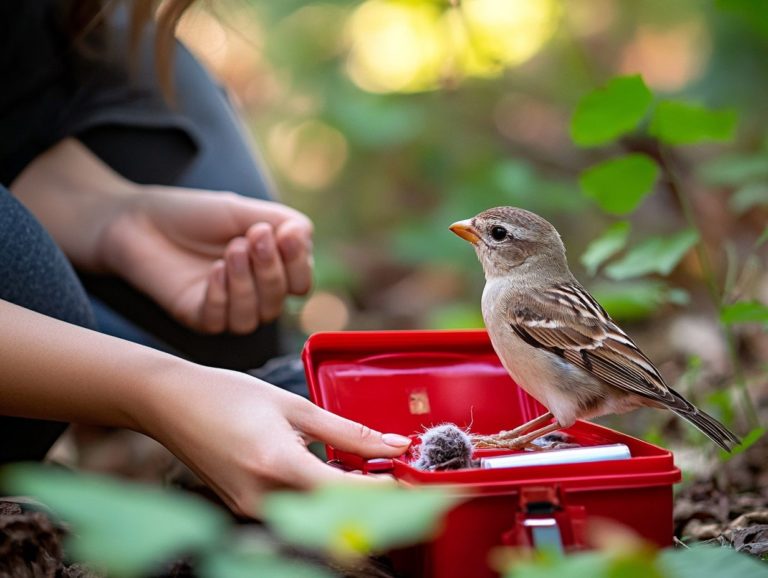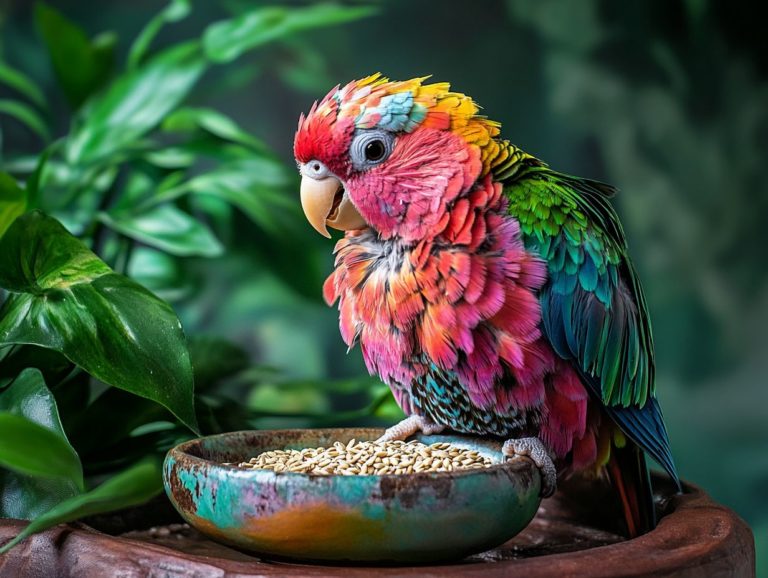What Are the Legalities of Bird Ownership?
Bird ownership can be an incredibly rewarding experience. However, it’s essential to be aware of the legal considerations that every potential bird owner should grasp.
From local laws governing which species are permissible as pets to national regulations designed to protect endangered birds, navigating the legal landscape is vital. This article also offers tips for handling legal issues that may come up, ensuring your journey into bird ownership is both fulfilling and in compliance with the law.
Contents
- Key Takeaways:
- Legal Considerations for Bird Ownership
- Types of Birds Allowed as Pets
- Requirements for Owning a Bird
- Legal Responsibilities of Bird Owners
- Dealing with Legal Issues as a Bird Owner
- Tips for Resolving Disputes
- Seeking Legal Help
- Frequently Asked Questions
- What are the legalities of bird ownership in the United States?
- Is a license required for bird ownership?
- Which species of birds are protected by law?
- Can I sell or trade my bird?
- Do I need to provide specific care for my bird to comply with legal requirements?
- What should I do if I find an injured or abandoned bird?
Key Takeaways:
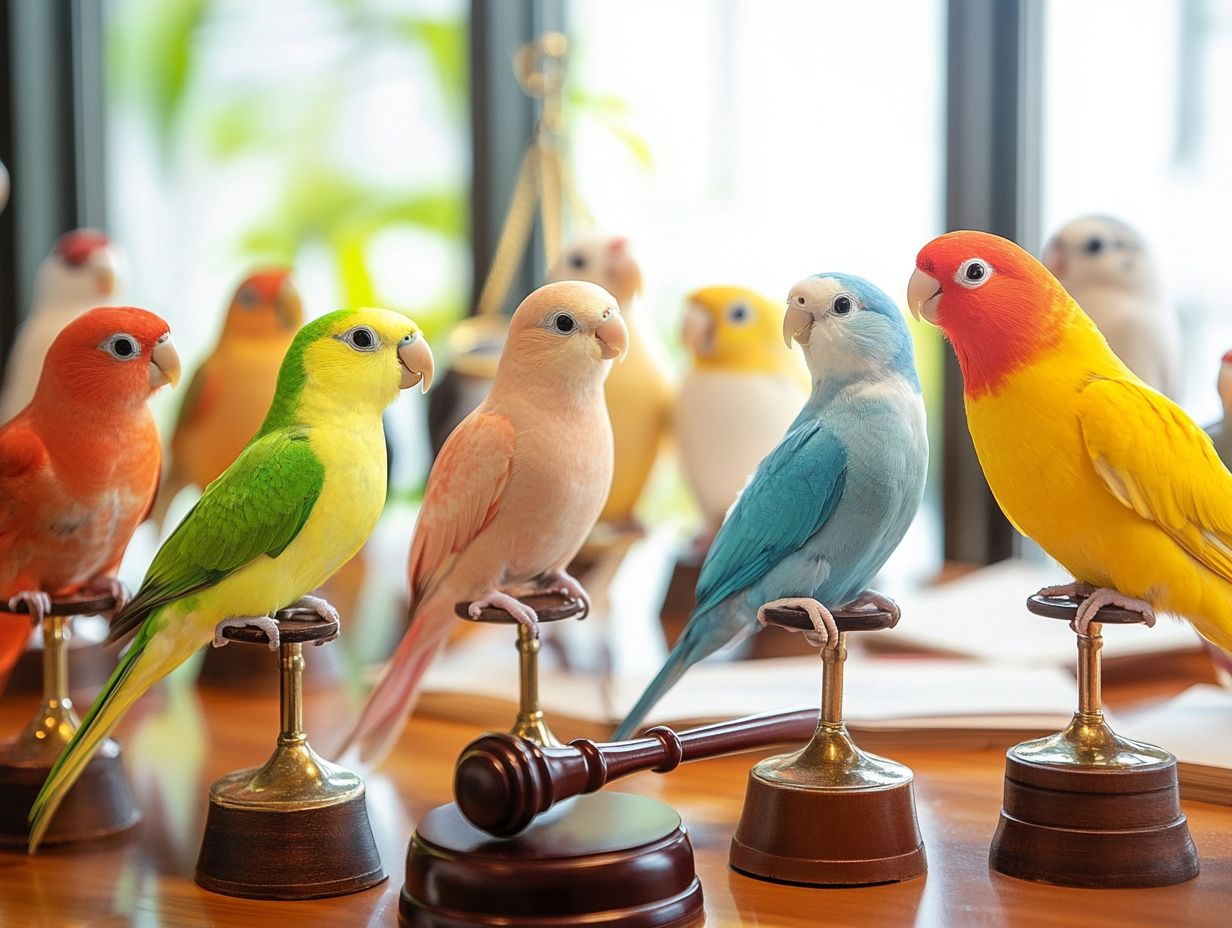
- Bird ownership is subject to local and national laws, which may restrict certain species or require permits.
- Commonly permitted pet birds include canaries and parrots, while exotic and endangered species may require special licenses.
- Owning a bird comes with legal responsibilities, including providing proper care and addressing any liability issues that may arise.
Legal Considerations for Bird Ownership
When you begin your journey into pet bird ownership, it s crucial to navigate the important legal rules that impact both the well-being of your feathered companions and your responsibilities as a parrot owner.
Laws at local and national levels govern various facets of bird ownership. This includes zoning regulations, municipal compliance, and adherence to animal rights statutes, including CITES permits. Grasping these regulations is essential, particularly if you’re considering adopting species like the blue-fronted Amazon or African grey parrot, which may come with additional restrictions.
Local and National Laws
Local and national laws play a pivotal role in determining which pet birds you can legally own and the conditions under which you can keep them. These laws often vary significantly by state and municipality.
For instance, if you’re in California, you’ll encounter strict regulations regarding the possession of certain invasive species that can impact your desire to adopt exotic birds.
Meanwhile, New Jersey has specific guidelines for breeding and selling pet birds, requiring breeders to obtain licenses to ensure the welfare of these creatures.
In Tacoma, local zoning ordinances dictate how many birds you can keep based on your property size. This directly influences your ability to maintain a diverse avian collection.
Knowing these regulations can make your bird ownership journey exciting and worry-free! Understanding laws influenced by CITES (the Convention on International Trade in Endangered Species) is crucial, as it protects endangered species from over-exploitation. This knowledge ensures that you comply with legal requirements while passionately pursuing your avian interests.
Types of Birds Allowed as Pets
Understanding which types of birds are permissible as pets is crucial for anyone considering avian companionship. Regulations can differ significantly based on species and your geographical location.
Popular choices, such as quaker parrots, blue-fronted Amazons, and African grey parrots, are often sought after for their remarkable intelligence and sociability. However, it s imperative for you to verify adherence to local laws and CITES regulations concerning exotic and endangered species.
This commitment not only ensures you remain within legal boundaries but also promotes the ethical treatment of these cherished companions. This is particularly important in light of issues related to animal rights and veterinary malpractice.
For more information on bird ownership and community engagement, consider joining local bird ownership groups or forums!
Commonly Permitted Species
Commonly permitted species of pet birds include popular choices like the quaker parrot, blue-fronted Amazon, and African grey parrot.
Each is known for its unique traits and delightful companionship.
The quaker parrot is revered for its playful and social nature. It often forms deep bonds with you as its caretaker.
To truly thrive, it requires ample interaction and mental stimulation. This means you ll be engaged in plenty of playful antics together.
On the other hand, the blue-fronted Amazon wows with its vibrant plumage and lively personality.
This spirited bird brings joy to your home with its cheerful vocalizations. It demands a spacious cage and regular socialization to keep its spirits high and its mind sharp.
Then there’s the African grey parrot, celebrated for its exceptional intelligence. It needs extensive social interaction to prevent behavioral issues from cropping up.
Understanding the specific legal regulations surrounding each species is also essential for responsible pet ownership.
This knowledge ensures that you practice responsible pet ownership while complying with local wildlife laws.
Exotic and Endangered Species
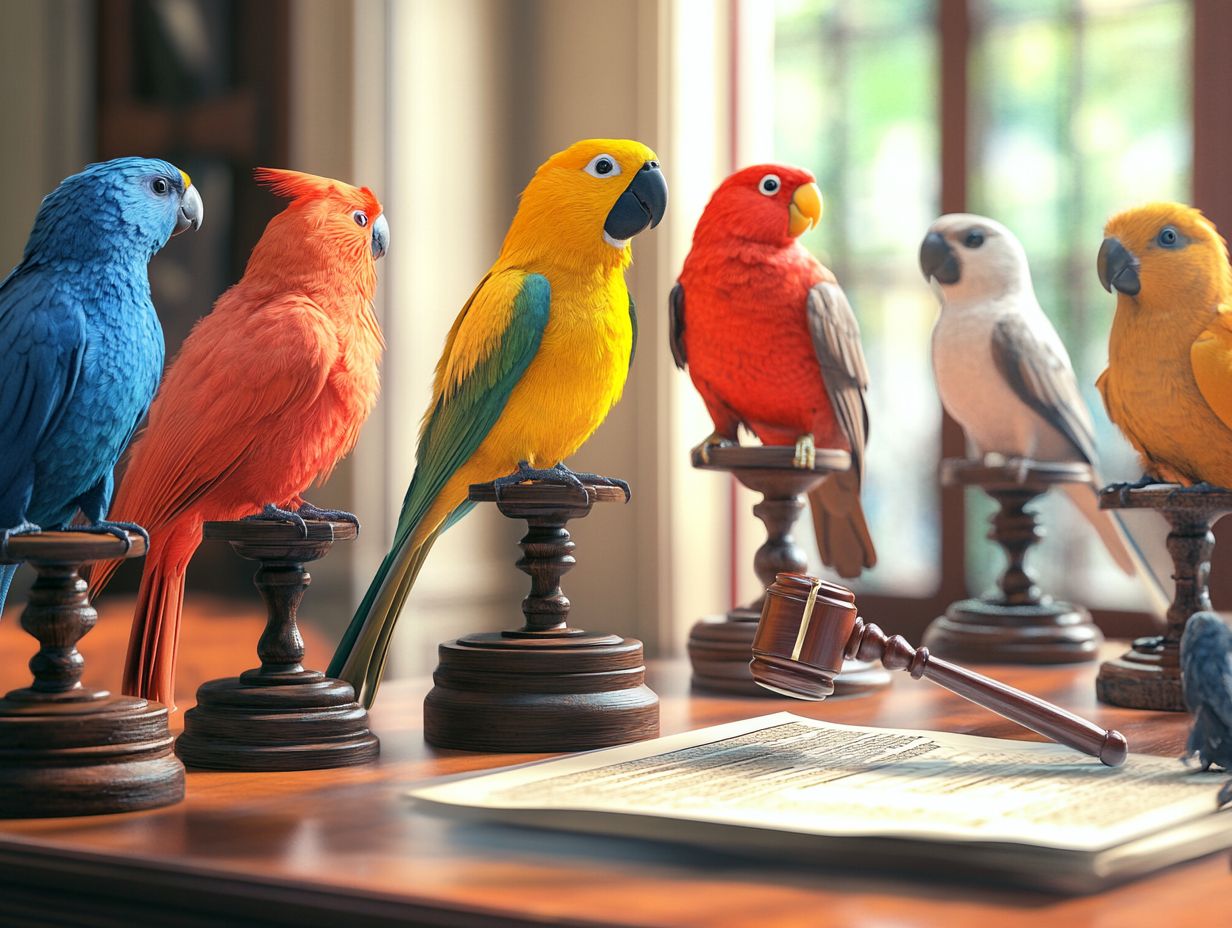
Exotic and endangered species of pet birds may captivate your heart, but they come with stringent legal requirements.
Often, ownership necessitates a CITES permit.
Navigating the legal landscape surrounding these magnificent creatures can feel overwhelming for prospective owners.
The Convention on International Trade in Endangered Species of Wild Fauna and Flora (CITES) plays a pivotal role in regulating the trade of various bird species.
This ensures they are protected against exploitation and illegal trafficking. CITES categorizes birds into different appendices, indicating their conservation status and the specific documentation needed for ownership.
For bird enthusiasts like you, grasping these regulations isn t just about compliance.
It s also crucial for actively contributing to conservation efforts that aim to preserve biodiversity and protect these extraordinary animals for generations to come.
Requirements for Owning a Bird
Owning a pet bird requires you to meet a range of essential standards.
- Ample space
- Suitable diet
- Regular veterinary care
- Familiarity with local laws
As a prospective bird owner, ensuring that your environment adheres to both legal and ethical guidelines is vital for the well-being of your avian companion.
This means providing a nurturing home to avoid potential pitfalls like veterinary malpractice. Familiarizing yourself with local animal laws is crucial.
Housing and Care Standards
Housing and care standards for pet birds are paramount to their health and happiness.
These standards encompass everything from the size of their cages to their social interaction needs.
Understanding the specific requirements of various species is key to ensuring their overall well-being.
For example, larger birds like macaws thrive in spacious enclosures that grant them ample room for flying and climbing.
Conversely, smaller parakeets prefer a slightly less expansive yet still enriching environment.
It s vital to provide appropriate perches, toys, and dietary considerations tailored to each species.
These care practices align with animal rights laws and animal control guidelines that champion the humane treatment of pets.
As a bird owner, you have the responsibility to cultivate an environment that nurtures both their physical and emotional health.
Before bringing a bird home, thoroughly research and prepare for their needs. This preparation is crucial for a successful and fulfilling companionship.
Licensing and Registration
Licensing and registration requirements for pet birds can vary significantly and are often influenced by local animal control laws and regulations.
If you’re considering welcoming a feathered companion into your home, it’s essential to understand these requirements to ensure compliance and avoid any unwelcome fines. Start by checking with your local authorities or animal control departments to gather precise information tailored to your area. You will usually need to fill out applications and provide some documents, and in some cases, undergo inspections.
As a bird owner, you might face challenges like restrictions on specific species, the need for special permits for exotic birds, or deadlines for registration renewals. Being mindful of these potential hurdles can help you steer clear of legal complications in the future.
Legal Responsibilities of Bird Owners
As a bird owner, you bear a range of legal responsibilities that extend to the welfare of your beloved pets. Following animal rights laws is very important; failure to comply can result in significant liabilities and consequences.
It’s essential to understand these obligations to ensure the well-being of your feathered companions and to navigate the legal landscape with confidence.
Liability and Consequences
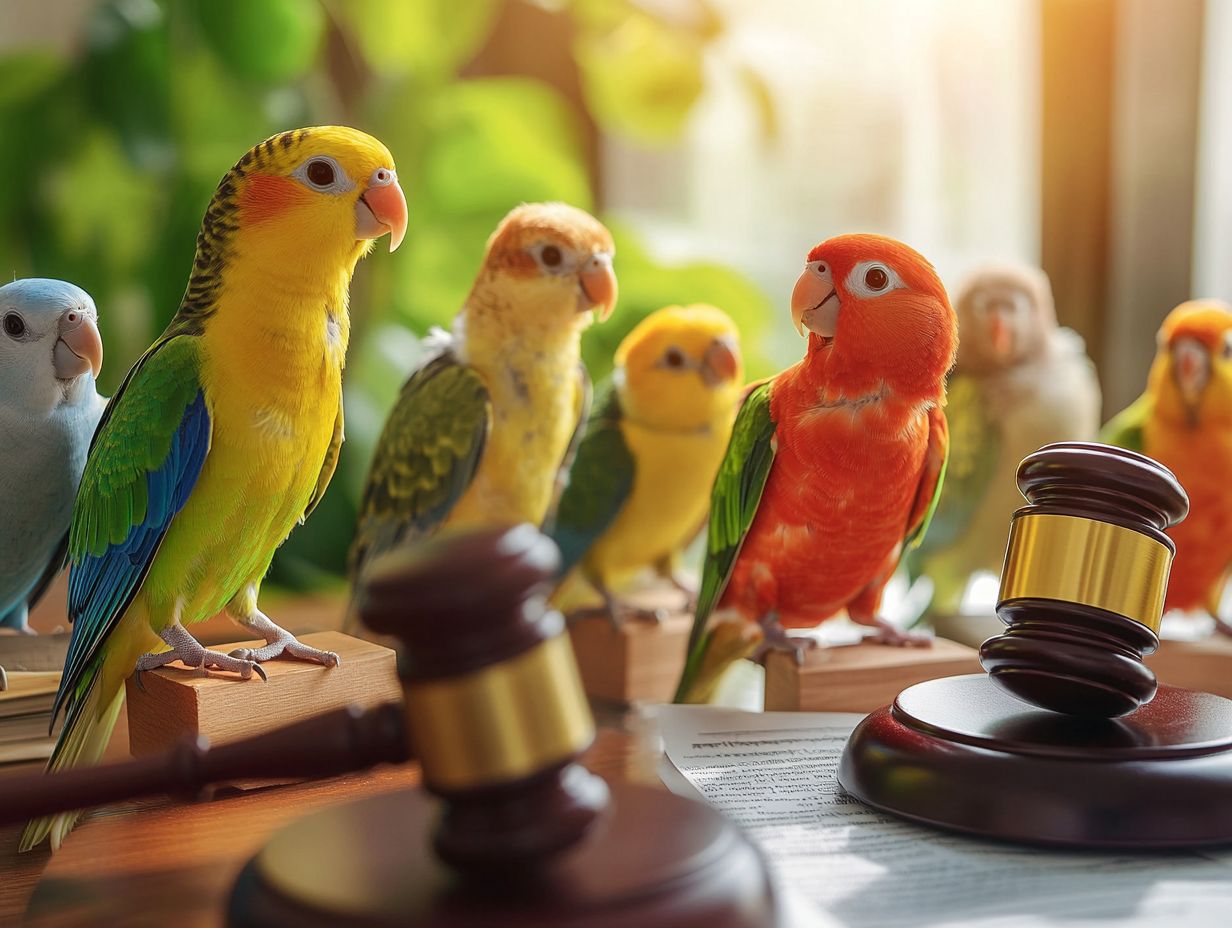
The liability and consequences tied to owning a pet bird can be quite severe, particularly in cases of neglect or legal infractions. When you, as a pet owner, fail to provide the necessary care or inadvertently violate local animal welfare laws, you may face significant penalties.
For instance, housing a bird in inadequate living conditions like a cage that is too small or lacking proper sanitation can lead to serious health issues for the animal. Such violations can attract hefty fines and potentially result in legal battles, which might include losing your bird or facing criminal charges.
With growing awareness around animal rights, enforcement of these laws has become more stringent. This means even unintentional neglect can carry dire legal ramifications.
Dealing with Legal Issues as a Bird Owner
Dealing with legal issues as a bird owner can feel overwhelming. It often demands a keen awareness of both local ordinances and broader animal laws. Whether you’re facing disputes with neighbors over bird noises or potential run-ins with animal control, it s crucial to be thoroughly informed about your rights and responsibilities as a pet bird owner.
Tips for Resolving Disputes
Resolving disputes involving pet birds often calls for a delicate touch in communication and a solid grasp of local laws regarding animal control and noise ordinances.
Whether you’re navigating a disagreement with a neighbor over the cheerful squawking of a parrot or striving to maintain harmony in a multi-bird household, effective strategies can pave the way for tranquility. As a bird owner, you should prioritize clear dialogue, voicing your concerns while remaining receptive to feedback.
Establishing a routine to share insights on bird behavior can enhance understanding among everyone involved. Familiarizing yourself with local animal control regulations gives you the power to advocate for your pets responsibly. This ensures that concerns are addressed within the legal framework and fosters positive relations with your neighbors.
Seeking Legal Help
When you encounter persistent legal challenges as a bird owner, seeking legal assistance can illuminate the path forward, ensuring compliance with animal law and local regulations.
When navigating the complex world of pet ownership dealing with zoning laws, breeding regulations, or even cases of animal cruelty talking to legal experts is crucial. In these circumstances, bird experts, veterinarians knowledgeable about local laws, or animal rights attorneys can provide invaluable insights.
Whether you’re contemplating the adoption of a new species or addressing potential disputes with neighbors or local authorities, the expertise of these professionals helps you avoid misunderstandings and safeguard the welfare of your birds.
By fully grasping your rights and responsibilities, you not only protect yourself but also promote the safe and responsible care of your beloved pets. Don t wait understand your rights and protect your feathered friends today!
Frequently Asked Questions
What are the legalities of bird ownership in the United States?
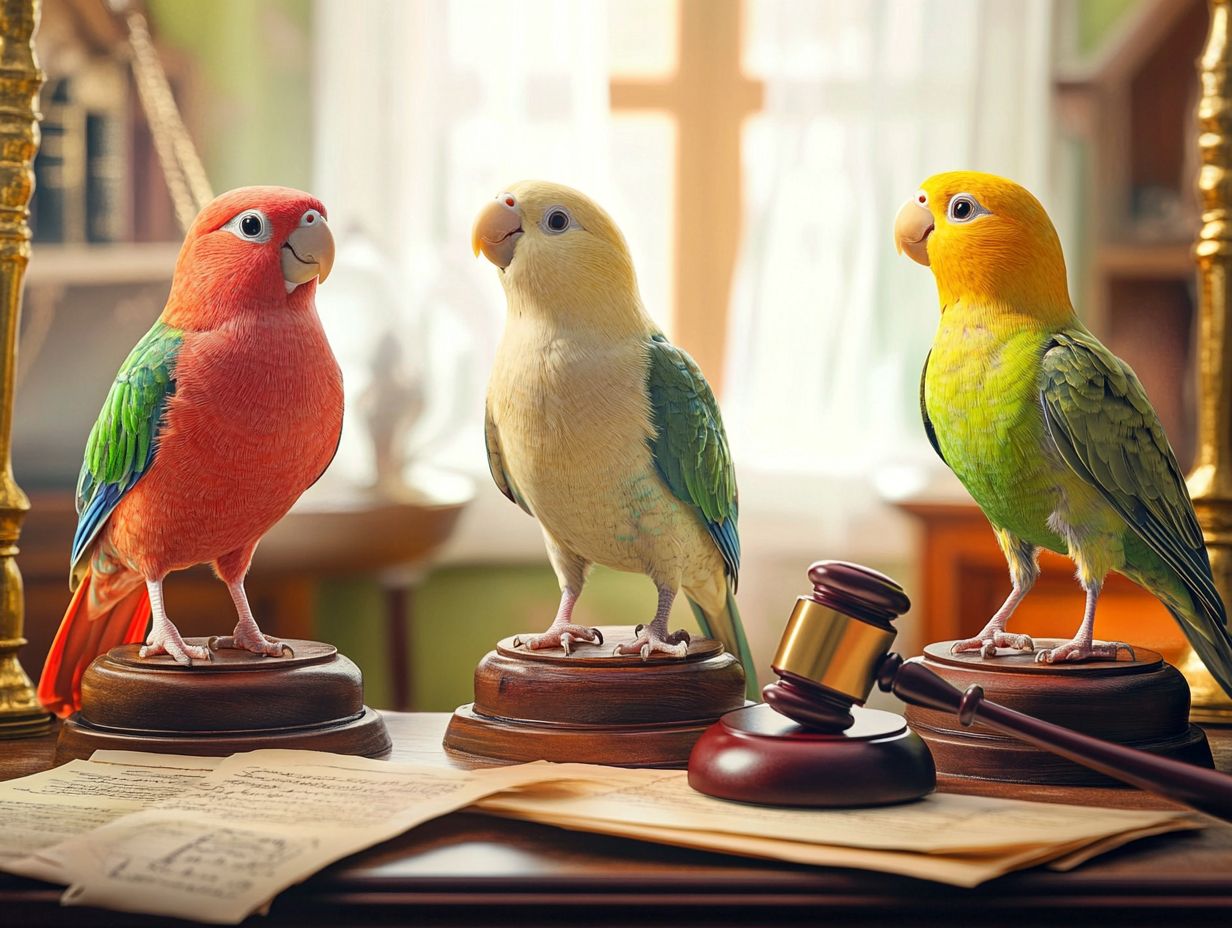
Bird ownership laws vary by state. Generally, owning birds is legal unless they are endangered or protected species.
Is a license required for bird ownership?
In the United States, there is no federal law requiring a license to own a bird. However, some states or cities may have specific requirements or restrictions for owning certain species of birds. It s crucial to check with your local government to ensure compliance!
Which species of birds are protected by law?
Several species of birds are protected by federal and state laws in the United States, including bald eagles, golden eagles, and migratory birds. It is illegal to own or harm these birds without proper permits or licenses.
Can I sell or trade my bird?
In most cases, it is legal to sell or trade your bird to another individual as long as it is not a protected or endangered species. However, some states may have specific regulations regarding the sale or trade of birds, so it is important to research and follow all applicable laws.
Do I need to provide specific care for my bird to comply with legal requirements?
While there are no specific legal requirements for bird care, it is essential to provide your bird with proper nutrition, housing, and veterinary care to ensure its well-being. Neglect or abuse of a bird can result in legal consequences.
What should I do if I find an injured or abandoned bird?
If you come across an injured or abandoned bird, it is best to contact a licensed wildlife rehabilitator or local animal control. These professionals are trained to care for wild birds and can provide guidance on how to properly handle the situation and comply with legal requirements.

